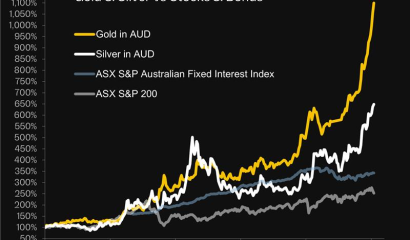Choosing the right direction of an economic trend can put a tailwind behind your asset allocation and wealth creation strategies.
The biggest debate right now in investment circles is whether we will continue to see a rise in inflationary trends, or whether ongoing deflationary forces will mean that the current uptick in inflation will be temporary.
In an article published in mid-February of this year, we outlined the arguments for the inflation trend, and how gold buyers can benefit.
The market seemed to agree with us, and in May 2021 gold was the top-performing major asset class.
The stakes in this debate are potentially very high. In the last large-scale inflationary episode (during the 1970s) the price of gold rose more than 2000% as a result.
Transitory or torrid?
Central bankers like the US Federal Reserve Chairman, Jerome Powell, would like people to believe that the inflationary trends are temporary because a long run of inflation would mean they had failed in their most important duty; to protect the value of the currencies they manage.
Economic growth of 3%, for example, would do very little good if the buying power of money were to fall 4% (or potentially much more) over the same period.
Last week, Chairman Powell insisted that the recent sharp uptick in inflation was “transitory”.
A review of the deflationary forces that have counteracted the inflationary money printing policies of the last few decades, however, would indicate that such countervailing forces may not come to the rescue of central bankers this time around:
- The inflation of the 1970s started to come down in earnest in the mid-1980s when the price of oil fell from $30 to $10 per barrel.
- This commodity crash led to the collapse of the Soviet Union, granting the West a one-time deflationary peace dividend.
- In the 1990s, Japan experienced severely deflationary stock market, bank, and real estate crashes.
- The 1995 Tequila Crisis in Mexico, and the 1997 Asian Financial Crisis both made producing goods abroad much cheaper.
- When China entered the World Trade Organisation in 2001, it brought in an additional 400 million workers to the global labour pool; deflating global wages.
- The Eurozone Greek crisis of 2011 and 2013 provided another deflationary hit.
- The US shale oil boom post-2016 stopped oil and gas prices rising.
Without these kinds of structural deflationary influences, as we move forward we may see a sustained tailwind pushing the price of gold higher.
Is it too late to ride the inflation wave?
Because gold bull markets tend to be based on large-scale macroeconomic forces (as opposed to shorter cycles like share market company earnings) they tend to last for a decade or more. So there’s still time to accumulate one of history’s best inflation protections at Rush Gold.
We will even reward you with a bonus of up to $250 AUD on all your gold purchases made before midnight on 30 June 2021!



